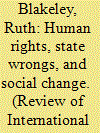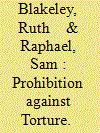|
|
|
Sort Order |
|
|
|
Items / Page
|
|
|
|
|
|
|
| Srl | Item |
| 1 |
ID:
172554


|
|
|
|
|
| Summary/Abstract |
When powerful liberal democratic states are found to be complicit in extreme violations of human rights, how do they respond and why do they respond as they do? Drawing on the example of the United Kingdom's complicity in torture since 9/11, this article demonstrates how reluctant the UK has been to permit a full reckoning with its torturous past. We demonstrate that successive UK governments engaged in various forms of denial, obfuscation and attempts to obstruct investigation and avoid accountability. The net effect of their responses has been to deny the victims redress, through adequate judicial processes, and to deny the public adequate state accountability. These responses are not simply aimed at shielding from prosecution the perpetrators and those who have oversight of them, nor preventing political embarrassment. The various forms of denial and obstruction are also designed to ensure that collusion can continue uninterrupted. A core concern of intelligence officials and ministers has been to prevent any process that would lead to a comprehensive prohibition on involvement in operations where torture and cruel, inhuman and degrading treatment are a real possibility. The door remains wide open, and deliberately so, for British involvement in torture.
|
|
|
|
|
|
|
|
|
|
|
|
|
|
|
|
| 2 |
ID:
120475


|
|
|
|
|
| Publication |
2013.
|
| Summary/Abstract |
This article demonstrates the significance of human rights for challenging state violence and terrorism. It is intended to enhance understanding of the concept of emancipation. Critical Security Studies has tended to focus on the individual as the agent of her/his own liberation. Yet many victims of oppression are not able to free themselves. Drawing on historical materialism, it is argued that collective agency on behalf of the oppressed has a necessary role to play in emancipatory politics. Emancipation is contingent on the capacity of specific agents, located socially and historically, to identify practices that might bring about change, structures that might be transformed, and appropriate agents that are in the best position to facilitate such change. This article shows how such collective social action has forced a reversal of some of the Bush administration's repressive policies, and has partially succeeded in curtailing the arbitrary use of US state power. This has been achieved through the national and international human rights architecture. Therefore, Marxian claims that human rights should be eschewed are mistaken, since they fail to acknowledge the emancipatory potential of human rights, the opportunities they provide for collective social action, and the role they can play in transformative social change.
|
|
|
|
|
|
|
|
|
|
|
|
|
|
|
|
| 3 |
ID:
168743


|
|
|
|
|
| Summary/Abstract |
While the UK's official position is that it neither uses nor condones torture or cruel, inhuman and degrading treatment (CIDT), it is now a matter of public and parliamentary record that UK security services and military personnel colluded in rendition, torture, and cruel, inhuman and degrading treatment, both as part of the CIA's Rendition, Detention and Interrogation (RDI) programme, at military detention facilities in Afghanistan and Iraq, and through involvement in the detention and interrogation of prisoners by allied security forces. This paper will explain why the government is falling short of its obligations under international law, and why considerable risks remain that UK intelligence and security services will continue to collude in torture and CIDT.
|
|
|
|
|
|
|
|
|
|
|
|
|
|
|
|
| 4 |
ID:
075648


|
|
|
|
|
| Publication |
2006.
|
| Summary/Abstract |
It is widely assumed that the School of the Americas (soa), a US training school for Latin American military forces, advocated repression during the Cold War. To demonstrate this, previous research has tended to focus on establishing correlations between training and specific human rights abuses by individuals trained at soa. A stronger case can be made through detailed analysis of soa training manuals within the context of US foreign policy towards the global South. Public protest led to soa's re-launch in 2001. Most protestors assume that this change was purely cosmetic. Based on extensive fieldwork, I argue that changes were genuine, and the School now has a commendable human rights programme. This is in contrast to most US military training, domestic and foreign, which remains secretive and devoid of adequate human rights instruction. The paper argues that a resurgence of support for repression since 9/11 undermines progress at the School.
|
|
|
|
|
|
|
|
|
|
|
|
|
|
|
|
| 5 |
ID:
080163


|
|
|
|
|
| Publication |
2007.
|
| Summary/Abstract |
develop a framework to account for torture, which I argue should be understood with reference to international relations. I show that torture is intended as a tool to ensure the security, stability and legitimacy of elites, often transnationally, but there is often a disjuncture between its intended and actual outcomes. Despite dominant claims that torture is used to defeat security threats, most torture is intended to deter political opposition and secure legitimacy for elites. I conclude that torture should be renounced, both on moral grounds, and because it is not necessary for the functions it is intended to serve
|
|
|
|
|
|
|
|
|
|
|
|
|
|
|
|
|
|
|
|
|